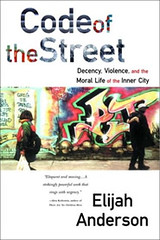Crime Time #7
 I think it's incredible that David Kennedy's piece on "the war at home," or the persistence of violent crime in our cities, "The Neighborhood War Zone," in today's Post Outlook section, discusses the rise of "street culture" and use the term "code of the streets" without acknowledging the work of Elijah Anderson, author of Code of the Street as well as Streetwise.
I think it's incredible that David Kennedy's piece on "the war at home," or the persistence of violent crime in our cities, "The Neighborhood War Zone," in today's Post Outlook section, discusses the rise of "street culture" and use the term "code of the streets" without acknowledging the work of Elijah Anderson, author of Code of the Street as well as Streetwise.My hypotheses would be that intensity of street-culture conflict increases with the level of social and economic exclusion, and increased economic disparities within a community. And that the current burst of violent crime coincides with a recognition of greater economic disparity. In DC at least, while certain neighborhoods are experiencing great increases in income and wealth, other neighborhoods are experiencing persistent and greater levels of poverty.
As long as a community doesn't address the deeper programmatic issues involved in addressing the culture and social and economic exclusion issues (quality of schools, safety of the neighborhood, the redevelopment of the neighborhood economy (such as outlined in the textbook Community Economic Development Handbook by Temali) it's likely that crime rates while dropping will hit a ceiling, and of course, will oscillate according to the state of the economy in a particular community.
Click here for the first chapter of Code of the Streets and here for a video illustration of the same chapter, "Down Germantown Avenue," produced by a group of students at Rutgers Unviersity.
Anderson's work is essential reading for understanding the issues involved in public safety. Another interesting take is this article from Mother Jones, "Straight Outta Boston."
Labels: crime, criminal justice system, policing, public safety



0 Comments:
Post a Comment
<< Home